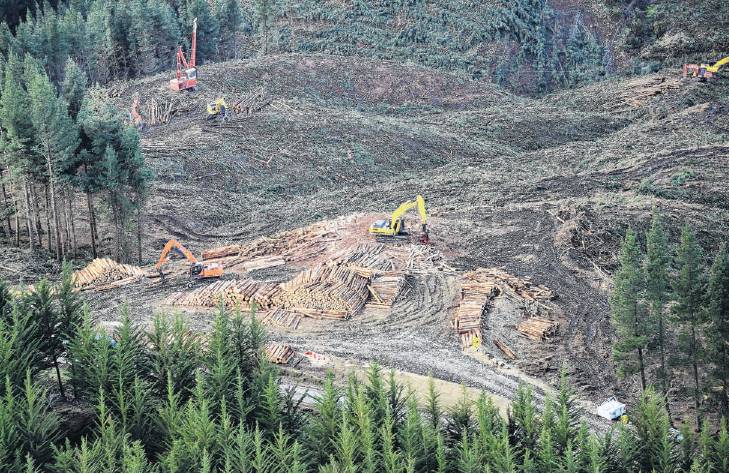
The potential powers the Government was seeking - to intervene in the log sales and contracts of forest owners - were ‘‘absurd’’ and went against any sensible business practices, chief executive Paul Nicholls told Parliament’s environment select committee this week.
Ernslaw One has forests throughout the country, including in the Coromandel, Gisborne, Ruapehu and Manawatu-Rangitikei regions, and Otago and Southland.
The lack of detail in the Bill and the open-ended scope of the proposed regulations meant any consideration of expansion at the firm’s pulp and timber operations near Tangiwai would be ‘‘on hold’’ until the company had a good understanding of the effects of the scheme.
By officials’ own admission, that detail could be two years away, Mr Nicholls said.
He would now struggle to recommend the projects, which could increase the capacity of the combined Tangiwai operations over five years from about 660,000 cubic metres a year now to 1 million cubic metres a year.
‘‘We will put all of those on hold until we fully understand how this Bill could be implemented,’’ he told the committee.
‘‘Honestly, if the Government wants this level of control of how logs are grown and sold in New Zealand, then they should buy the forests and manage it themselves.’’
Submitter after submitter has told the committee the consultation on the Forests (Regulation of Log Traders and Forestry Advisers) Amendment Bill has been farcical and its rushed implementation under Budget urgency an abuse of process.

Even those who favour improving the standard of advice to small forest owners - one aspect of the Bill - say the scheme is more likely to increase costs than improve log prices for growers.
They also say Forestry Minister Shane Jones’ bid to try to ensure a predictable flow of logs to domestic processors is an effort to fix a problem that does not exist.
Grant Dodson, chief executive of Dunedin City Council owned City Forests, told the committee the industry had been ‘‘ambushed’’ by the minister and the Bill.
‘‘This is not a log supply issue. This is purely a pricing play,’’ he told the committee.
The Bill was ‘‘an absolute disaster for the industry and it cannot proceed in its current form’’.
Forestry is this country’s third-biggest export earner after dairy and meat, bringing in more than $6 billion a year from shipments of logs, panels, timber and wood pulp.
About 35 million cu m of wood is harvested annually, of which about 15 million cu m is processed here.
Kaingaroa Timberlands chief executive Robert Green said the firm updated its harvest profile quarterly and monthly based first on what its local customers needed.
About 60% of its harvest was sold domestically and that volume had increased by about 750,000 tonnes - 40% - during the past five years.
However, Mr Green said forestry was a‘‘breakdown’’ industry. Every component of the wood flow had to be used and the company needed access to export markets to ensure it could sell the full range of log grades coming out of its harvest.
The potential restrictions on that from the Bill could have ‘‘significantly negative impacts’’ on the industry, he said.

‘‘There has been no cost analysis done on the Bill, and many are concerned it will deter people from investing in forestry and create uncertainty in the industry,’’ Mr Walker said.
‘‘Clause 63ZZ of the Bill also gives the Government the ability to introduce a levy which is worrying for many in the industry.
‘‘Imposing a levy may benefit a few sawmills, but it will increase costs to the rest of the sector.”
‘‘To increase our standard of living, we need an open economy and to sell our products to the rest of the world. Imposing additional cost and regulation to the forestry sector and making them pay a levy is the exact opposite of what is needed,’’ he said.
- BusinessDesk, Additional reporting Otago Daily Times












